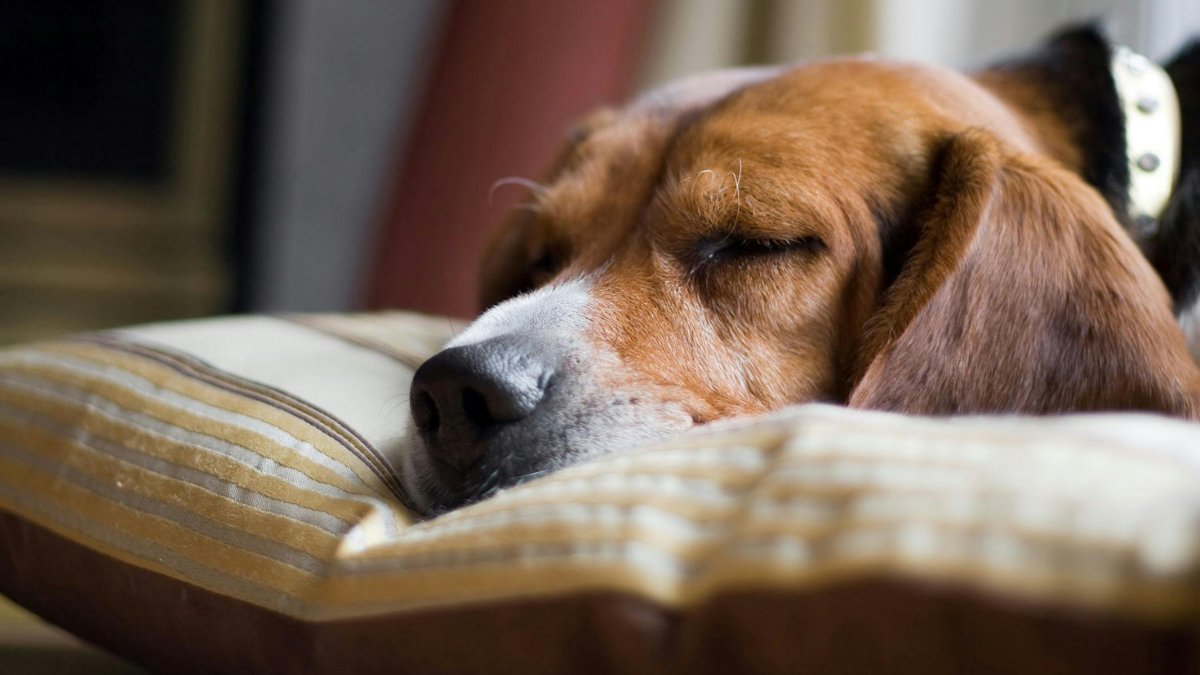Many dog owners will agree that their furry friends are more than just pets - they are family members. As such, ensuring that they are well-cared for is a top priority. One of the most important aspects of a dog's health is sleep. Just like humans, dogs need adequate sleep to function properly. However, many dog owners struggle with common sleep problems in their pets. Explore effective strategies for 'Troubleshooting Common Sleep Problems in Dogs' and ensure your canine companion gets the rest they need for optimal health and happiness.
Fortunately, there are ways to troubleshoot these issues and help dogs get the restful sleep they need. In this article, experts will provide advice on how to identify and address common sleep problems in dogs. From excessive barking and restlessness to snoring and sleep apnea, readers will learn how to recognize the signs of sleep issues and take appropriate action. With the right guidance, dog owners can help their furry friends sleep soundly and improve their overall health and well-being.

"Discover the transformative power of Fi's advanced technology in pet care. Your dog's sleep matters more than you may realize, and with Fi, you can now monitor their naps and nighttime rest with unparalleled ease and precision. Say goodbye to uncertainties and take the first step towards ensuring your furry friend gets the quality sleep they deserve. Elevate your pet care routine and explore the possibilities with our innovative collar today! As you've learned, just like humans, dogs need quality sleep to thrive.
Whether it's addressing common sleep issues like insomnia or sleep apnea, or optimizing their sleep environment, ensuring your dog gets the rest they deserve is essential for their health and happiness. Take the first step towards improving your pet's sleep and overall quality of life – explore our innovative collar today!"With Fi's cutting-edge technology, track your dog's sleep patterns effortlessly, giving you valuable insights into their overall well-being."
Understanding Canine Sleep Patterns
Dogs, like humans, require adequate sleep to maintain good health and well-being. However, unlike humans, dogs have different sleep patterns and requirements. Understanding the sleep patterns of dogs can help pet owners identify and address common sleep problems in their furry friends.
The Sleep Cycle of Dogs
Dogs have a unique sleep cycle that consists of two phases: rapid eye movement (REM) sleep and non-rapid eye movement (NREM) sleep. During REM sleep, dogs experience rapid eye movements, increased brain activity, and muscle relaxation. This phase is when dogs are most likely to dream.
On the other hand, NREM sleep is characterized by slower brain activity and muscle tone. During this phase, dogs are in a deeper sleep and are less likely to be disturbed by external stimuli.
A typical sleep cycle for dogs lasts about 90 minutes, during which they alternate between REM and NREM sleep. Puppies and senior dogs tend to sleep more than adult dogs, with puppies sleeping up to 20 hours a day and senior dogs sleeping up to 18 hours a day.

Factors Affecting Dog Sleep
Several factors can affect a dog's sleep patterns, including age, breed, health, and environment. For instance, brachycephalic breeds such as bulldogs and pugs are more prone to sleep apnea due to their short snouts, which can lead to disrupted sleep.
Additionally, dogs that suffer from medical conditions such as arthritis or anxiety may find it difficult to sleep comfortably. Environmental factors such as noise, temperature, and lighting can also affect a dog's sleep quality.
Overall, understanding the sleep patterns of dogs and the factors that affect their sleep can help pet owners identify and address common sleep problems in their furry friends.
Identifying Common Sleep Issues
Dogs, like humans, need a good night's sleep to stay healthy and happy. However, just like humans, dogs can experience sleep problems that can lead to a variety of health issues. Here are some of the most common sleep problems that dogs experience:
Insomnia in Dogs
Insomnia is a sleep disorder that affects dogs just as it does humans. Dogs with insomnia have difficulty falling asleep or staying asleep. This can be caused by a variety of factors, including anxiety, pain, or discomfort. Insomnia can lead to a variety of health problems, including depression, anxiety, and weight gain.
Sleep Apnea
Sleep apnea is a condition where a dog's breathing is interrupted during sleep. This can be caused by a variety of factors, including obesity, allergies, or a narrow airway. Sleep apnea can lead to a variety of health problems, including fatigue, irritability, and heart disease.

Restless Sleep Syndrome
Restless sleep syndrome is a condition where a dog is unable to stay asleep. Dogs with restless sleep syndrome may wake up frequently during the night or have trouble falling back asleep. This can be caused by a variety of factors, including anxiety, pain, or discomfort. Restless sleep syndrome can lead to a variety of health problems, including depression, anxiety, and weight gain.
Narcolepsy in Canines
Narcolepsy is a sleep disorder where a dog suddenly falls asleep during the day. This can be caused by a variety of factors, including genetics, brain injury, or a tumor. Narcolepsy can lead to a variety of health problems, including accidents, injuries, and obesity.
By identifying these common sleep issues, dog owners can take steps to help their pets get a good night's sleep. If you suspect that your dog is experiencing any of these sleep problems, it's important to consult with a veterinarian to determine the underlying cause and develop an appropriate treatment plan.
Behavioral and Environmental Influences
Stress and Anxiety
Stress and anxiety are common causes of sleep problems in dogs. Dogs can experience stress and anxiety due to various factors such as separation anxiety, fear of loud noises, or changes in their environment. It is essential to identify the root cause of stress and anxiety and address it accordingly. Some helpful strategies include providing a comfortable and safe sleep environment, increasing exercise and playtime, and using calming aids such as pheromone diffusers or calming music.
Diet and Exercise
Diet and exercise play a significant role in a dog's overall health and well-being, including their sleep quality. Feeding a balanced diet and providing regular exercise can contribute to better sleep in dogs. It is important to ensure that dogs receive adequate exercise during the day to help them sleep better at night. Additionally, feeding a high-quality diet that meets their nutritional needs can help promote better sleep.

Sleep Environment Optimization
Creating a comfortable and safe sleep environment is crucial for dogs to have a good night's sleep. Factors such as temperature, noise level, and lighting can affect a dog's sleep quality. Providing a comfortable and supportive bed, ensuring the room is quiet and dark, and adjusting the temperature to a comfortable level can all contribute to better sleep. Additionally, minimizing disruptions during the night, such as limiting access to food and water, can help dogs sleep more soundly.
In summary, addressing behavioral and environmental factors can help improve sleep quality in dogs. Identifying the root cause of stress and anxiety, providing a balanced diet and regular exercise, and optimizing the sleep environment can all contribute to better sleep for dogs.
Medical Causes of Sleep Disturbances
If your dog is experiencing sleep disturbances, it could be due to a variety of medical issues. Here are some common medical causes of sleep problems in dogs that you should be aware of:
Pain and Discomfort
Pain and discomfort can make it difficult for dogs to fall asleep or stay asleep. Common causes of pain and discomfort in dogs include arthritis, hip dysplasia, and dental problems. If your dog is experiencing pain or discomfort, they may be restless, whine, or have difficulty settling down to sleep. If you suspect that your dog is in pain, it's important to take them to the vet for an evaluation.
Allergies and Skin Issues
Allergies and skin issues can cause dogs to itch and scratch, which can disrupt their sleep. Common allergens that can affect dogs include pollen, dust mites, and certain foods. If your dog is scratching excessively or has red, inflamed skin, they may have allergies or a skin condition that requires treatment. Your vet can help you identify the cause of your dog's skin issues and recommend appropriate treatment.
Neurological Disorders
Certain neurological disorders can cause sleep disturbances in dogs. For example, dogs with epilepsy may experience seizures during sleep, which can disrupt their rest. Dogs with cognitive dysfunction syndrome (CDS), a condition similar to Alzheimer's disease in humans, may also experience changes in their sleep patterns. If you suspect that your dog has a neurological disorder, it's important to take them to the vet for an evaluation.
By understanding the medical causes of sleep disturbances in dogs, you can help ensure that your furry friend gets the restful sleep they need to stay healthy and happy. If you suspect that your dog is experiencing sleep problems due to a medical issue, don't hesitate to seek veterinary care.
Practical Solutions for Sleep Problems
Routine and Consistency
Establishing a consistent sleep routine can be a simple and effective solution for many sleep problems in dogs. This involves creating a regular bedtime and wake-up time for your furry friend. It's also important to ensure that your dog gets enough exercise during the day, as this can help them sleep better at night. Additionally, providing a comfortable and quiet sleeping environment can also help your dog relax and fall asleep easier.

Sleep Aids and Supplements
There are a variety of sleep aids and supplements available that can help your dog get a better night's rest. Some common options include calming supplements, such as melatonin or chamomile, which can help reduce anxiety and promote relaxation. Other options include pheromone sprays, which can help create a calming environment, or a comfortable dog bed with memory foam or other supportive materials.
Professional Training and Therapy
In some cases, professional training or therapy may be necessary to address more severe sleep problems in dogs. This may involve working with a certified dog trainer to address behavioral issues that may be interfering with your dog's sleep, or working with a veterinary behaviorist to develop a customized treatment plan. In some cases, medication may also be prescribed to help your dog sleep better.
Overall, with a little patience and the right approach, most sleep problems in dogs can be successfully addressed. By establishing a consistent routine, providing a comfortable sleeping environment, and considering the use of sleep aids or professional training, you can help your furry friend get the restful sleep they need to stay happy and healthy.
When to Consult a Veterinarian
If your dog is experiencing sleep problems that are causing concern, it may be time to consult a veterinarian. A veterinarian can help diagnose and treat any underlying medical conditions that may be interfering with your dog's sleep. Here are some signs that it may be time to schedule a visit:
Recognizing Serious Symptoms
If your dog is experiencing any of the following symptoms, it's important to seek veterinary care as soon as possible:
- Excessive panting or drooling
- Difficulty breathing
- Seizures
- Loss of consciousness
- Vomiting or diarrhea
- Unusual behavior or aggression
These symptoms could be signs of a serious underlying medical condition and require prompt attention from a veterinarian.
Preparing for Your Visit
Before your visit, it's important to provide your veterinarian with as much information as possible about your dog's sleep problems. Keep track of when your dog is sleeping, how long they are sleeping, and any unusual behaviors or symptoms. This information can help your veterinarian diagnose any underlying conditions and develop an appropriate treatment plan.

Treatment Options and Follow-Up Care
Treatment options for sleep problems in dogs will vary depending on the underlying cause. Your veterinarian may recommend medication, behavioral therapy, or a combination of both. It's important to follow your veterinarian's instructions carefully and schedule any necessary follow-up appointments to monitor your dog's progress.
In summary, if your dog is experiencing sleep problems that are causing concern, it's important to consult a veterinarian. They can help diagnose and treat any underlying medical conditions and develop an appropriate treatment plan to help your dog get the restful sleep they need.
Conclusion:
In conclusion, troubleshooting common sleep problems in dogs is paramount for promoting their overall health and happiness. By recognizing and addressing these issues, pet owners can significantly enhance their furry companions' quality of life. Whether it's disturbances, overstimulation, or difficulties adjusting to new environments, understanding the root causes allows for tailored solutions that cater to each dog's unique needs.
Effective troubleshooting involves creating a conducive sleep environment, maintaining consistent routines, and incorporating calming techniques when necessary. Seeking advice from veterinary professionals can also provide valuable insights and guidance for addressing specific sleep challenges.
Ultimately, investing time and effort into troubleshooting common sleep problems demonstrates a commitment to the well-being of our beloved canine friends. By ensuring they receive adequate and restful sleep, we contribute to their overall health, behavior, and longevity.
In summary, troubleshooting common sleep problems in dogs is an essential aspect of responsible pet ownership. Through patience, observation, and proactive intervention, we can help our furry companions achieve optimal sleep quality and enjoy fulfilling lives by our side.




